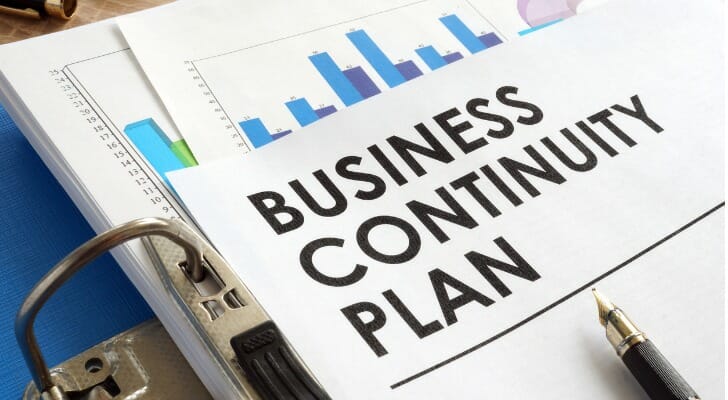 Creating a financial contingency plan for your business is just as important as creating one for your personal finances. Part of that plan may include purchasing a key person insurance policy. Key person insurance is a type of life insurance that’s designed to cover the most important person or persons within a business. This type of insurance can help ensure that the business is able to continue operating if a critical owner or employee passes away. You may also choose to have this kind of policy in place as part of a buy-sell agreement when passing the business on to someone else.
Creating a financial contingency plan for your business is just as important as creating one for your personal finances. Part of that plan may include purchasing a key person insurance policy. Key person insurance is a type of life insurance that’s designed to cover the most important person or persons within a business. This type of insurance can help ensure that the business is able to continue operating if a critical owner or employee passes away. You may also choose to have this kind of policy in place as part of a buy-sell agreement when passing the business on to someone else.
Key Person Insurance, Definition
Ordinarily, when you purchase life insurance, you might do so to create a financial benefit for your spouse or children. You could name your spouse as the beneficiary and if you pass away, they’d be entitled to receive the policy’s death benefit amount which they could then use to manage their personal expenses.
Key person insurance, on the other hand, is life insurance that protects your business. Instead of replacing lost income for a spouse or another beneficiary, key person insurance can be used to maintain or rebuild the business if you or another key employee passes away.
How Key Person Insurance Works
Key person insurance can be purchased from an insurance company the same as any other life insurance policy. Typically, the company would purchase the policy and pay the premiums for coverage. The policy could be used to cover one or more key employees, including the owner(s) of the business.
The business itself serves as the beneficiary of the policy. So if a key person who is covered by the policy passes away, the insurance company would pay a death benefit to the business.
The business could then use the proceeds of a key person policy as it sees fit. For instance, possible uses include:
- Hiring and training new employees to replace the key person who was lost.
- Covering day-to-day operating expenses if the business has to shut down temporarily following the death of a key employee.
- Paying off creditors to avoid the possibility of having to file for bankruptcy.
- Making up lost revenue if the person who passed away was a top sales driver.
Key person insurance is designed to keep a business running if the owner or another critical employee dies. But it can also be used to cover any costs related to closing the business down, including paying debts or offering severance packages to employees, if keeping the doors open isn’t an option.
Advantages of Key Person Insurance

The main benefit of key person insurance for business is that it can keep your business from having to close if you or another key employee aren’t there to run it. Beyond that, however, there can be some additional benefits.
First, if you choose a permanent life insurance policy such as universal life, your policy may accumulate cash value over time. Depending on how the policy is structured, you may be able to borrow against that cash value to fund small business expenses. Just keep in mind that borrowed amounts that are not repaid can reduce the policy’s death benefit.
Next, having key person insurance in place could make it easier for your business to get approved for loans or lines of credit. Having this type of coverage offers reassurance to lenders that they would still be repaid for any outstanding loans if you were to pass away.
It’s important to remember that key person insurance is designed to cover you for the benefit of your business. If you’re married and/or have children, you’d still need to consider having personal life insurance as well as key person insurance.
Who Needs Key Person Insurance?
You might assume that only large corporations would need to have a key person insurance policy. And while it’s helpful for companies to have their top executives covered by such a policy, it can also have applications for smaller businesses.
For instance, you may consider purchasing key person insurance for business if:
- You operate a family-owned business and you want to ensure that your children or other relatives who work for you will be able to keep your legacy going.
- Your small business is in the process of expanding and you want reassurance that those plans will be continued if something happens to you.
- You don’t want your employees to be left in a financial lurch if you were to pass away unexpectedly.
Key person insurance can also be used in other situations involving small businesses. For example, say you’ve worked out a succession plan that involves selling your share of the business to your partner once you’re ready to retire. The two of you have a buy-sell agreement in place outlining the terms of the sale.
A key person life insurance policy could ensure that they have the funds necessary to complete the purchase of the business if they were to pass away before their scheduled retirement date. The policy could name the business or your partner as a beneficiary, giving them liquid cash they could use to finalize the business purchase.
Do Sole Proprietors Need Key Person Insurance?
A sole proprietorship is a one-person show, meaning you’re the only owner of the business and the only one who works in it. If you operate a sole proprietorship, then key person insurance most likely wouldn’t be necessary.
The exception is if you plan to sell the business to someone else eventually. In that situation, you may need to have key person insurance to fund a buy-sell agreement.
How to Buy Key Person Insurance

If you think your small business could benefit from having a key person policy, take time to shop around with different insurers to compare premium amounts. You can start with your current insurance company if you already have personal life insurance coverage.
When comparing key person policies, consider:
- Whether you want term or permanent coverage.
- The coverage amount your business realistically needs.
- Premium costs.
- When and how you can withdraw cash value if you’re purchasing permanent coverage.
- Who you want to be covered by the policy.
Keeping those things in mind can help you find a key person insurance policy that best fits your business needs.
The Bottom Line
Key person insurance for business isn’t just for large corporations. It can also be useful if you run a smaller business and want to protect your partners and/or employees in the event something happens to you or your partnership has a falling out. Shopping around for key person insurance can help you find the most affordable rates and the best coverage terms.
Tips for Business Owners
- Many financial advisors specialize in working with business owners with unique financial needs and they can help with a number of different issues or opportunities. Finding a financial advisor doesn’t have to be hard. SmartAsset’s free tool matches you with up to three vetted financial advisors who serve your area, and you can interview your advisor matches at no cost to decide which one is right for you. If you’re ready to find an advisor who can help you achieve your financial goals, get started now.
- Key person insurance is one tool you can use to protect your small business financially and it can be incorporated into a broader succession plan. Something else to consider is retirement planning. Establishing a SIMPLE IRA or SEP IRA, for example, can offer a tax-advantaged way for you to invest for your later years.
Photo credit: ©iStock.com/Morsa Images, ©iStock.com/nadia_bormotova, ©iStock.com/designer491